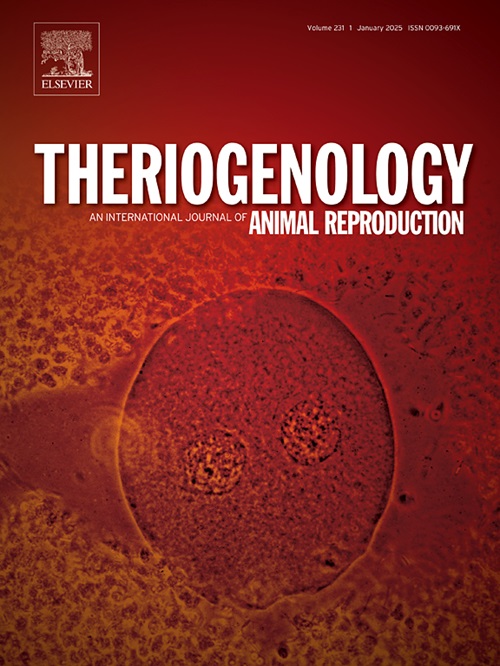甲磺酸米托喹啉对Beltsville培养基中冷藏公鸡精液解冻后特性及受精能力的影响。
IF 2.4
2区 农林科学
Q3 REPRODUCTIVE BIOLOGY
引用次数: 0
摘要
公鸡精液的低温保存是一种生殖技术,用于提高商业鸡群的遗传增益和生产力。然而,精子冷冻会显著降低精子的质量和受精潜力。本研究通过评估公鸡精子的解冻后特性,研究了在冷冻扩展剂中添加线粒体靶向抗氧化剂甲磺酸米托喹啉的冷冻保护作用。精液样品在添加0、1、10、100或1000 nM甲磺酸米托喹啉的Beltsville扩展器中稀释。在冷冻保存的精液解冻后,我们评估了以下精子参数:活力和形态、膜完整性和线粒体功能、顶体完整性、细胞凋亡状态、脂质过氧化、DNA片段化、活性氧(ROS)积累、表观遗传模式(DNA甲基化和组蛋白修饰)和受精能力。在含有10或100 nM甲磺酸米托喹啉的延长剂中稀释的精液在精子活力、平均路径速度、膜/顶体完整性、线粒体功能指数和DNA/组蛋白修饰方面显著优于其他所有冻融精液样品。此外,与其他稀释剂相比,添加10和100 nM甲甲酸米托喹啉显著降低了脂质过氧化、细胞凋亡率、DNA片段化和ROS浓度,与未添加对照组相比,受精率更高(P≤0.05),但与使用新鲜精液相比仍显著降低。然而,可以得出结论,甲磺酸米托喹啉显著改善了公鸡精液的一系列质量参数和受精潜力,因此可以推荐在商业家禽经营中使用的精液冷冻保存过程中作为稀释剂添加剂。本文章由计算机程序翻译,如有差异,请以英文原文为准。
The effects of mitoquinol mesylate on post-thaw characteristics and fertilizing ability of rooster semen cryopreserved in the Beltsville medium
Cryopreservation of rooster semen is a reproductive technology carried out to boost genetic gain and productivity in commercial flocks of chicken. However, semen freezing significantly reduces the quality and fertilizing potential of spermatozoa. This study examined cryoprotective effects of the mitochondria-targeted antioxidant mitoquinol mesylate added to the freezing extender by assessing post-thaw characteristics of rooster sperm. Semen samples were diluted in the Beltsville extender supplemented with 0, 1, 10, 100 or 1000 nM of mitoquinol mesylate. Following the thawing of cryopreserved semen doses, we evaluated the following sperm parameters: motility and morphology, membrane integrity and mitochondrial function, acrosome integrity, apoptosis status, lipid peroxidation, DNA fragmentation, reactive oxygen species (ROS) accumulation, epigenetic patterns (DNA methylation and histone modifications), and fertilizing ability. Semen diluted in extenders containing 10 or 100 nM of mitoquinol mesylate significantly exceeded all other groups of frozen-thawed semen samples in sperm motility, average path velocity as well as membrane/acrosome integrity, mitochondrial function indices and DNA/histone modification. Moreover, the addition of 10 and 100 nM of mitoquinol mesylate significantly reduced lipid peroxidation, apoptosis rate, DNA fragmentation and ROS concentrations compared with all other dilutions and was associated with a higher (P ≤ 0.05) fertilization rate compared with a non-supplemented control group, albeit it was still significantly lower compared with that obtained using fresh semen. It can be, however, concluded that mitoquinol mesylate significantly improved an array of quality parameters and fertilizing potential of rooster semen, and hence can be recommended for use as a diluent additive in semen cryopreservation procedures employed in commercial poultry operations.
求助全文
通过发布文献求助,成功后即可免费获取论文全文。
去求助
来源期刊

Theriogenology
农林科学-生殖生物学
CiteScore
5.50
自引率
14.30%
发文量
387
审稿时长
72 days
期刊介绍:
Theriogenology provides an international forum for researchers, clinicians, and industry professionals in animal reproductive biology. This acclaimed journal publishes articles on a wide range of topics in reproductive and developmental biology, of domestic mammal, avian, and aquatic species as well as wild species which are the object of veterinary care in research or conservation programs.
 求助内容:
求助内容: 应助结果提醒方式:
应助结果提醒方式:


